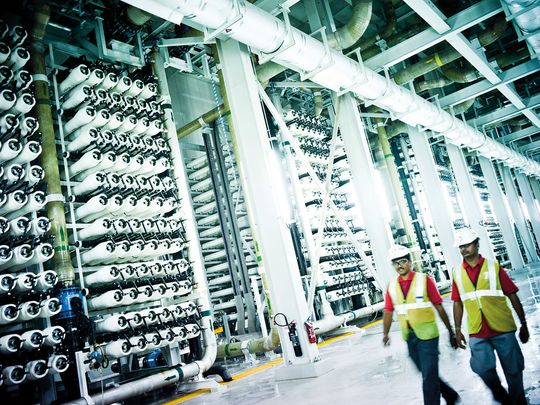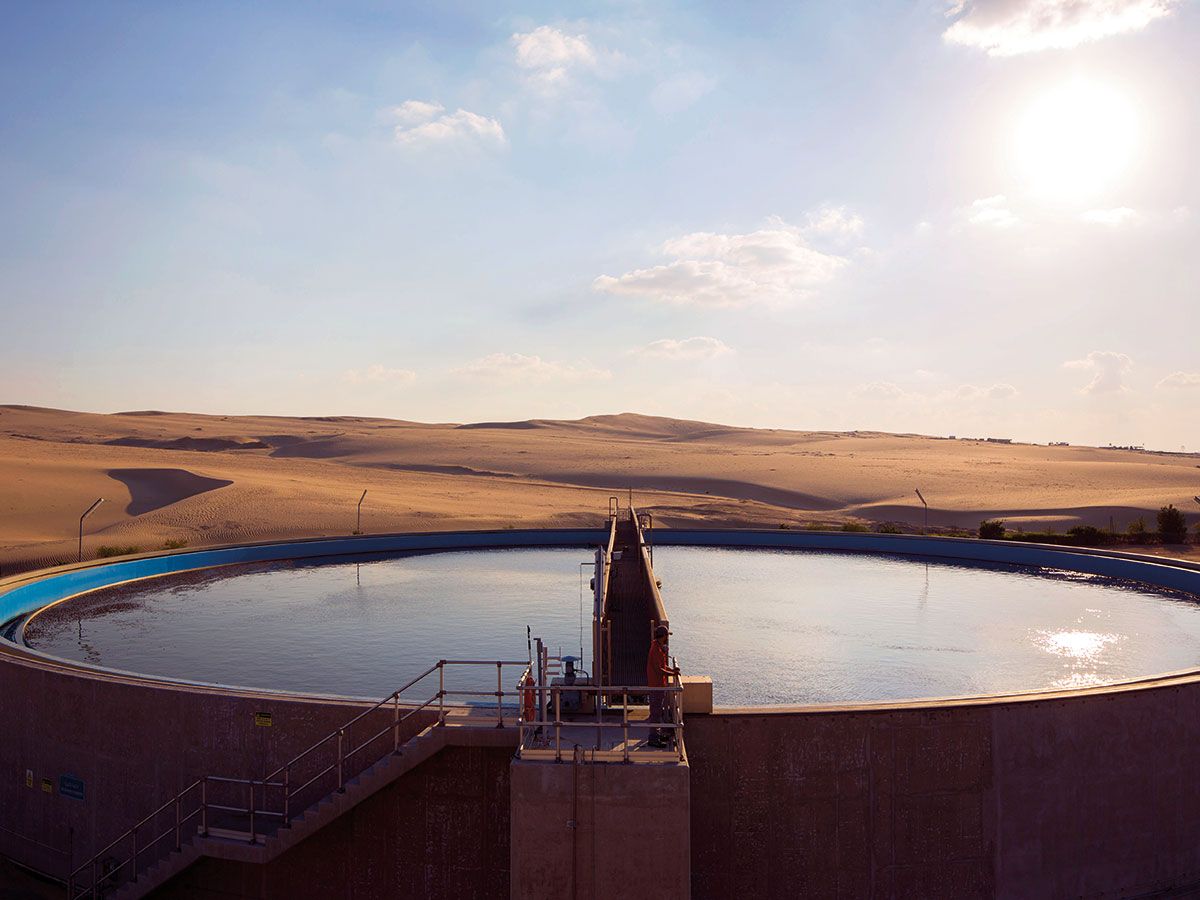
When the UAE welcomes the world to COP28 at Dubai Expo City in a few days’ time, it will herald the beginning of a UN climate summit like no other. As mandated by the Paris Climate Agreement, the key agenda at the heart of COP28 UAE is to deliver the first-ever Global Stocktake (GST) — a comprehensive evaluation of progress against climate goals that will help align the massive efforts under way on climate action.
Opportunity to shape our future
Indeed, confronting this collective challenge requires the world to respond with a clear action plan and collaborative solutions: with the clock ticking to limit global warming to 1.5 degrees Celsius, no single country, industry or company can deliver this monumental change alone. All of us need to seize this critical opportunity to shape our future.
That’s why I am looking forward to joining thousands of industry leaders from around the world at COP28 in Dubai in search of positive, action-oriented engagements and driving positive outcomes in the quest to accelerate practical and progressive climate action.
As frequently stated by Dr Sultan Ahmed Al Jaber, COP28 President-Designate, UAE Special Envoy for Climate Change, and Minister of Industry and Advanced Technology, COP28 will lead a robust process for all parties to agree upon a clear road map to accelerate progress through a pragmatic global energy transition that leaves no one behind. The summit will create the space and the environment for all parties to convene and find common ground – uniting in their joint efforts to make the world a more sustainable, resilient and productive place.
Such inclusive climate action to preserve and protect our natural resources while helping industries progress and prosper is precisely what Veolia has been engaged in for the past 35 years in the Near and Middle East. Our status as the global champion of ecological transformation implies that we carry the great responsibility of setting the gold standard in environmental solutions. True to that legacy, Veolia Near and Middle East has been at the forefront of pioneering the region’s circular economy by providing essential services, protecting the environment and human health, fighting pollution, and creating alternative resources based on our pillars of energy, water and waste management.

Veolia Near and Middle East has been at the forefront of pioneering the region’s circular economy by providing essential services, protecting the environment and human health, fighting pollution, and creating alternative resources based on our pillars of energy, water and waste management.
These three pillars are particularly critical when operating in one of the world’s most water-scarce regions that also has the world’s highest rate of domestic water consumption and is going through an unprecedented phase of rapid urbanisation and population growth.
Legacy of sustainable projects
At Veolia, we consider ourselves a catalyst seeking to change this reality and usher in a new era of eco-friendly development – and that’s evident in our vast and diverse body of sustainable projects achieved across the region in the past decades. When it comes to managing utilities and resources, Veolia is the only company in the Middle East that works across the whole spectrum of environmental services. We are at the forefront of sustainable technology, creating innovative solutions to develop access to resources, preserve and replenish them.
Pioneering waste-to-energy in the region, our Sharjah plant provides green electricity for up to 28,000 homes in the emirate, while the Al Warsan Biogas-to-Energy plant in Dubai produces 45,000 MWh of electricity per year through the conversion of biogas recovered from the digestion of wastewater sludge. It also helps reduce Al Aweer Sewage Treatment plant’s CO2 emissions by more than 26,000 tonnes per year. Building on our deep know-how in circular economy, Veolia further complements these local loops of energy and supports decarbonisation through the deployment of renewable energy solutions such as solar panels.
The company has ushered a new era of green energy in Oman by implementing the sultanate’s largest solar system for a desalination plant in Sur — the 17 MWp solar photovoltaic (PV) farm boasts an annual capacity of 32,000 MWh of green electricity, which will cover 100 per cent of the plant’s consumption over the daylight period.
Elevating the water agenda
Water is yet another critical component of a sustainable future — and COP28 is expected to elevate water on the climate agenda. The COP28 Water Agenda identifies three priority areas: conserving and restoring freshwater ecosystems, enhancing urban water resilience, and bolstering water-resilient food systems.
These are exactly what Veolia has been working on for decades at its plants and facilities in the region. Today, Veolia Near and Middle East provides potable water to 4.57 million people in the region, and has managed to connect 6.72 million people to proper sanitation.

In Jordan, Veolia supplies 50 per cent of Amman’s population with potable water via a 254km conveyance pipeline as part of its DAOM project, while in Oman, more than 3 million people are able to access clean drinking water thanks to the Sur Desalination Plant and the Quroon, Tiwi & Qalhat, and Ad Dhakhiliya Reverse Osmosis plants.
As a company deeply involved in the management of the global water cycle, Veolia’s municipal wastewater solutions have had a major impact in making agriculture more sustainable. In Jordan, the Samra wastewater treatment plant processes 130 m cubic metres of wastewater annually for irrigation purpose to supply to 66 farms around the site — leading among other things to the restoration of the fauna and flora of Zarqa river.
Similarly, when it comes to energy-efficient utilities, Veolia manages more than 150 Energy Performance Contracts around the region with guaranteed savings. Thanks to Hubgrade – the company’s control centre — Veolia can monitor energy efficiency of buildings and guarantee energy and utilities supply performance.
Overwhelming response to RECAPP
RECAPP, Veolia’s digital recycling solution for individuals and businesses, has meanwhile achieved phenomenal success in increasing the recycling reflex and boosting the circular economy in the UAE with its app-based door-to-door collection service — reinforcing the UAE’s target of recovering 50 per cent of single-use plastic bottles. The programme has so far garnered about 74,000 user registrations with a total collection of 227,279 tonnes and counting.
Another field of achievement for Veolia that is prominently aligned with the agenda of COP28 is preserving biodiversity as more agricultural land gets degraded and food insecurity increases. Restoring agricultural land, preserving forests, protecting coastlines and safeguarding lives and livelihoods everywhere is among the top priorities for Veolia, as it is for the COP28 agenda.
In Ajman, Veolia’s Moalajah wastewater treatment plant for Ajman Sewage Company has scored major environmental wins with 161 species of birds — both migratory and non-migratory – identified there since the beginning of the project. The project has also led to the creation of 25 hectares of Wetlands, where in February this year we spotted an Eastern Yellow Wagtail — the first ever observed in the UAE.
Resourcing the world
As these projects demonstrate, we see ourselves as a very different kind of business in the region: our purpose is to help our public and industrial customers with their ecological transformation — such as helping cities and industries to decarbonise and to regenerate resources. Abiding by Veolia’s motto of Resourcing the World, Veolia Near and Middle East has been for the past 35 years supporting public sector and industries to meet their biggest challenges in terms of resource efficiency, growth, compliance, and digitisation.
Our work is aimed at making a difference, and going by the results of a first-of-its-kind survey on ecological transformation conducted earlier this year, it already is.
The survey, conducted by Veolia and Elabe, shows that while 79 per cent of people living in the UAE share the certainty of climate disruptions and 61 per cent believe that human activity is the leading cause, 55 per cent feel that the future is still in our hands. Indeed, the survey found that 6 in 10 people in the UAE are willing to accept 95 per cent of the changes that come with the green solutions provided they pose no health risks, have bearable economic and cultural costs, and contribute to the country’s food or energy security.
This same spirit of optimism prevails in the run-up to the final hours before COP28 begins: a milestone event that must achieve the “highest possible ambition” in the words of Dr Al Jaber. By fast-tracking the energy transition; focusing on nature, people, lives and livelihoods, and ensuring full inclusivity, COP28 offers us a historic opportunity to make a course correction. As with Veolia’s official mission, building a better and more sustainable 21st century is no longer an option but an urgent necessity — and the way to do it is by acting together and acting now at COP28.
– The writer is the CEO of Veolia Near & Middle East



